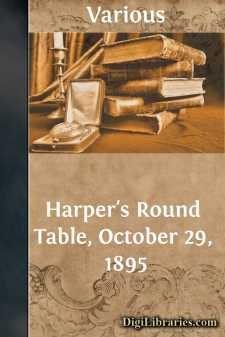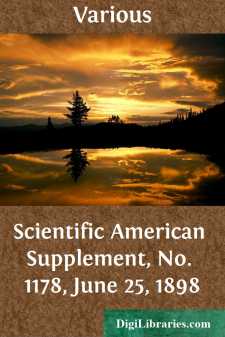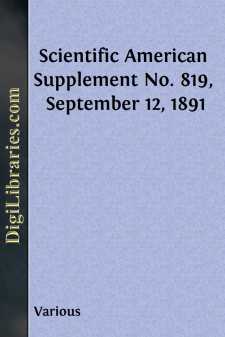Categories
- Antiques & Collectibles 13
- Architecture 36
- Art 48
- Bibles 22
- Biography & Autobiography 813
- Body, Mind & Spirit 142
- Business & Economics 28
- Children's Books 17
- Children's Fiction 14
- Computers 4
- Cooking 94
- Crafts & Hobbies 4
- Drama 346
- Education 46
- Family & Relationships 57
- Fiction 11829
- Games 19
- Gardening 17
- Health & Fitness 34
- History 1377
- House & Home 1
- Humor 147
- Juvenile Fiction 1873
- Juvenile Nonfiction 202
- Language Arts & Disciplines 88
- Law 16
- Literary Collections 686
- Literary Criticism 179
- Mathematics 13
- Medical 41
- Music 40
- Nature 179
- Non-Classifiable 1768
- Performing Arts 7
- Periodicals 1453
- Philosophy 64
- Photography 2
- Poetry 896
- Political Science 203
- Psychology 42
- Reference 154
- Religion 513
- Science 126
- Self-Help 84
- Social Science 81
- Sports & Recreation 34
- Study Aids 3
- Technology & Engineering 59
- Transportation 23
- Travel 463
- True Crime 29
Harper's Round Table, October 29, 1895
by: Various
Description:
Excerpt
"What was it that Obed saw?" That question used to be asked by chimney-corners in the great farm-houses of an old New England neighborhood for many years.
For Obed in his boyhood on a certain last night of October, "when the moon was round," had seen a spectacle the account of which filled the minds of many good people with wonder and of simple people with terror. Even the cats and dogs seemed to be uneasy when it was discussed in an awesome tone of voice on old red settles, for such animals seem to share the fears of their masters. "Come, now, Obed is no fool," the work-people used to say.
"What do you suppose it was that he saw? It was proper strange!"
Obed lived in one of the farm neighborhoods near Medfield, a town famous in King Philip's war. The place has a fearful legend of a family who were killed by the Indians, and a very curious story of a farmer who saved his family at the time of the Indian attack by rolling out of the cellar a barrel of cider.
It is a quiet town to-day, not a long ride from Boston. It would delight a tired man or an artist; it is old-fashioned and full of rural beauty, a bit of old New England left over, as it were. Great elms throw their cloudlike shadows over the trim and well-kept roads in summertime. The churches, the homes, the farms all show a historic pride. Here great orchards once bloomed; here the Baltimore orioles still swing in the elms, and the bobolinks topple in the clover meadows. Here the lilacs still bloom by door-yard walls, and the people draw water from the round stone wells of the generations gone.
Obed was a "bound boy," as an apprentice lad was called. He was "bound out," to use another old New England term, to a certain Mr. Miller, who was a farmer and a cobbler. This Mr. Miller was named Brister—Brister Miller—a surname not uncommon in colonial times.
A bound boy was one who was "let out" by his parents or guardian or the "selectmen" to the service of another for a term of years; really, a slave for a limited time. Brister Miller had in his family a bound boy and a bound girl.
The girl's name was Eliza. She had come to Boston from England. Her parents had died, and she had been found a home on Brister Miller's bowery farm. Bound children and boys and girls worked hard in the old times, and had but few privileges. They were sometimes allowed to go to the "General Training," and to share in the husking frolics, and they were always permitted to listen for a time after "early candlelight" to the stories that were told on old red settles in cool weather by the open fires.
As Eliza had come from England she was called "English Eliza." She was a good-hearted, resolute girl. She became a great friend to Obed, whom her warm heart pitied, owing to her own hard and solitary lot.
It was the last day of October. There had been a warm rain, which had kept Obed and English Eliza from the husk heap. The weather had suddenly changed towards evening. A chill had come down from the north, and the family and work-people had gathered after supper around the crackling fire. Mr. Miller sat shelling corn with a cob, and Mrs. Miller began to knit by the tallow candle....












